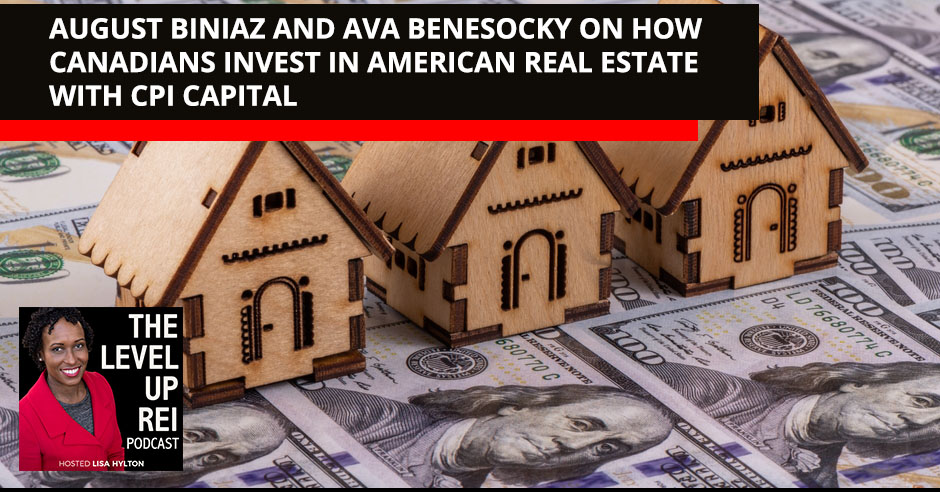
The concept of syndications isn’t really mainstream in Canada like it is in the US. With double taxation, it’s difficult for Canadians to invest in American real estate. This is where CPI Capital comes in with its new approach to remote investing. Join your host Lisa Hylton as she sits down with August Biniaz and Ava Benesocky of CPI Capital. August is the CSO/COO and Co-founder of CPI Capital, and Ava is the CEO and Co-founder of CPI Capital. Join in the conversation and learn how Canadians can invest in American real estate.
—
Watch the episode here
Listen to the podcast here
August Biniaz And Ava Benesocky On How Canadians Invest In American Real Estate With CPI Capital
I have on the show amazing guests Ava Benesocky and August Biniaz. They both joined forces in 2019, realizing the pain points of Canadian investors who were facing. In their fields of expertise, they founded CPI Capital, a Canadian-based real estate investment firm that is focused on discovering, acquiring, improving and actively managing US multifamily, value-add real estate assets. They specialize in stabilizing large assets, producing revenue which allows them to pay their investors on a regular basis distributions immediately after closing the property. I am super excited to have you both on the show. Welcome.
Thank you so much for having us. We’re excited to be here.
Thank you for having us, Lisa.
I’m excited to have you on. I ran across you on LinkedIn. You were working on a project and I was like, “They’re Canadian investors. I want to have you guys on.” We know that you live in Canada but I forgot what province.
We live in British Columbia in Vancouver.
It’s the most West Coast province in Canada. It’s similar to California. We’re at the California of Canada.
That works because I’m in LA. We’re both West Coast together. What do you guys like to do for fun?
The list goes on. We’re active. British Columbia is very beautiful landscaping here. We love to road bike, hike, paddleboard when the sun is shining. It rains a little bit here. When the sun shines, we take advantage of that. That’s what we do for fun.
Mostly doing active things like Ava mentioned.
Canadians are super conservative. They're happy with the 5 to 6% annualized return. What more if they can build their wealth passively? Share on XI want to jump into the meat of this episode. One of the things that I’m curious about and I know people reading are curious about, is what are the steps? If they are Canadian investors, someone who’s living in Toronto or in Vancouver and they have been desiring to invest in American real estate, how do they go about doing that?
Maybe we could take a quick step back and discuss what it was about US real estate that pushed us as Canadian real estate professionals to totally pivot our focus into US real estate and create CPI, which is a company that helps Canadians invest in the US. Other than the common-sense items such as US having near ten times the population of Canada, there’s an interstate migration happening in the US. Every level of government is business-friendly. Other than these known points, also, in Canada, the issue that exists here is we don’t have the job growth and the population growth that the US has.
Also, when there is population growth, it’s mainly in two of the main cities, Vancouver and Toronto. In these cities, similar to California, where you are, the cap rates have been compressed so low that the real estate doesn’t provide cashflow. In most conventional cases, if there’s a 35% down payment and there is 65% of debt borrowed on the rent collected, there’s not enough capital to be able to pay the rents. The rent-to-value ratios are very low. Real estate prices are extremely high, even higher than most places in California, here in Vancouver and Toronto. That entry point for people wanting to invest in real estate like you could do in the US, buy a home for $200,000 or for $300,000 in a lot of states like Texas and what have you, that doesn’t exist here in the large cities in Canada.
Initially, when we started CPI, we sought a need that existed for people in Vancouver and Toronto wanting to invest in real estate but couldn’t get into the initial step to invest because the prices were so high. Their mortgage laws are very rigid here in Canada. Also, the fact that as people want to invest in real estate, now you’re threading the line between being passive and active. You have to be actively managing the property. We’ve got introduced to you as multifamily and this concept of syndication where other groups would buy these already built assets. They would do some small renovation and it exited in a matter of 3 to 5 years.
All while paying their investors great returns coming from the rents they collected. That concept to us was so foreign to us because we were used to, “If you put on 35% from the wrench you collect on a single-family, multifamily, condo, there is not enough surplus to have any income,” but in the US because of the high rent to value ratios, these groups were able to pay their investors returns from day one. We fell in love with the concept and we went on a six-month educational journey to find out how it is possible for Canadians to be able to invest in the US and also be relieved from double taxation.
It was so foreign to us as real estate investors already, that we were like, “We got to spread the word about this concept.” Canadians are super conservative. They’re happy with the 5% to 6% annualized return. This new-found concept, alternative investment opportunity, we’re like, “We got to stop everything and bring this to our Canadian investors, so that they can build wealth passively as a passive investor and not have all this chaos.” Real estate investing is chaos in different ways.
We’re like, “What a great thing that we can begin here for helping others achieve, building wealth passively.” Literally building wealth while they sleep is what I like to call it. That’s the background about Canadians and the pain points that exist. Now your question was, “How does a Canadian invest in an alternative investment that’s right across the border?”
There are two parts. Canadians can invest in the US and buy US real estate but that’s on a personal level. It depends on what their exit strategy is and what’s going to happen to the funds. Are the funds staying in the US or plan to move to the US or are the funds needed to be brought back to Canada? That’s where issues come in as far as double taxation. When the funds come back to Canada, anyone in investing in the US has to pay their US taxes but anytime those funds come back to Canada, they have to pay Canadian taxes as well. They’re double taxed. We got to give the disclaimer that we’re not accountants and lawyers. Consult with your accountant and tax lawyer about any of these items for anybody reading.
For information purposes, we’ll give you our experience. That’s the case when you invest in the US for a single-family. Again, if you’re investing in single-family in the US being an active investor, now you are a remote investor. You’re not boots on the ground. It makes the process a lot difficult than if somebody’s here in Vancouver and they buy a condo and they want to rent it out or to buy a home and they want to fix it up and sell it, they’re there. They can get the contractors to help them out, but in the US, it’s difficult. There are lots of red tape.

CPI Capital: Population growth mostly happens in Vancouver or Toronto. These cities’ cap rates have been compressed so low that real estate doesn’t provide cash flow there. That entry point doesn’t exist in Canada.
They have to build a team in the whole nine yards. The benefit of coming through a real estate syndication like investing in the syndication opportunities that you provide, do they experience double taxation?
On the personal level, as far as investing in US real estate, we discussed that now. What we notice is there’s this concept called syndication in the US that doesn’t exist here in Canada. There are companies here and there that do it. We wanted to bring this mainstream on this side of the border but the hurdle was again double taxation. Through the structure we’ve created with our Canadian fund and US fund structure, we create a project-specific fund for each deal that we do. It is somewhat of a costly and cumbersome process but it does make sense when you have many investors coming in and the cost is then divided between all investors.
It’s a nominal amount. Whereas if one investor did it, the cost would be very high. We create a Canadian fund-US fund structure that acts as a flow-through. There are taxes paid on the US side. When those profits reached back here to Canada, the investor lets the CRA, Canadian Revenue Agency, know that, “I’ve paid the taxes on these profits that I’ve made. Please file that against my Canadian taxes and don’t double tax me on it.”
Something that a lot of people don’t know is there’s a treaty that exists between Canada and the US, which allows for a foreign tax credit to take place if you have your corporate structure aligned properly. This is what we’ve set in place to help Canadians have a super streamlined process. Another thing, too, is Canadians invest in our Canadian fund, which gives them limited liability and they’re investing with a Canadian entity. There’s legal recourse and so forth. Canadians are very conservative people.
We’re in a very niche type of business. We’re in that concept of apartment syndication or real estate syndication or, as we like to call it here, a CPI Real Estate Private Equity. It’s this concept of bringing investors, funding the deal and managing the whole project for a portion of the profits. That’s the concept. In this real estate private equity space, to be able to bring these deals to Canadians and have a streamlined process, that’s what our focus is.
As a result of this, they don’t necessarily need to create bank accounts and entities in the US because you have set it up. You’re in Canada. You’ve set up the entity in Canada and the structures where people are investing through your entity. From your entity, they’re getting directly into that particular investment that day, then review the documents and say that they feel comfortable investing in.
Two points there. One, yes, you’re correct. There’ll be investing in a Canadian entity, so they don’t need to create any US entities, but two points, the investments are always made in US dollars. Rather than saying, “Make the investment in Canadian dollars, then we’ll make the conversion,” the investments are all US dollars. Investment is made in US dollars. The returns are in US dollars and the final profits are in US dollars and their returns. They do have a Canadian Bank US account. They need to have that here in Canada.
Super simple process. They call the Canadian Bank and say, “I want to open up a US account.”
Most people have a US account. On the US side, each individual Canadian investor who invests in our fund still has to file for the US taxes annually. That’s it, but in most cases, especially in these multifamily syndications, the returns that are paid to investors are a return of capital. In most cases, they’re filing zero profits for the term of the project, but they still have to file it. We also assist. We try to advise and educate our investors through the whole process. As Ava likes to call it, holding the hand of the investor. It’s a very streamlined process. They have to file for their US taxes every year and they need to have a Canadian Bank US account.
There's a treaty between Canada and the US that allows a foreign tax credit if you have your corporate structure aligned properly. Share on XWhen you are working with US syndicators, are there certain syndicators that will accept Canadian investors or not? Does that then require this indicator to then do withholding taxes on behalf of your Canadian entity?
It depends. Let’s take a step back. This is great to mention we have two business models. One is to syndicate our own deals. Our other business model is we have spent the last few years scouting some of the best operators in the US, syndicator/operator. People who take deals through the whole process, find a deal, underwrite it, manage it, do the value, add process and exit it. We found some great US operators. We’ve made a partnership with our US operators. As they have deals, we cherry-pick the best deals possible and we present those deals to our investors. Depending on the project, we connect our legal team and our accounting team.
There’s the structure being created from day one for the Canadian fund in the US fund done with the advisor, our accountants and lawyers, so everything is tax efficient. That US fund will accept our Canadian fund as an investor but it also accepts the co-syndicator or the co-GPs, also US investors into the same fund. It has to be a process that’s done from day one. As far as the withholding tasks, yes, so is the US fund that treats the Canadian fund as another one of his investors and there is withholding tax that is made for that Canadian entity, which is a single investor. That is the tax that Canadian investors file, saying that, “There’s a withholding tax that I paid for,” not to get double tax for it.
Connected to that, you talked about you syndicate your own deals. When you syndicate your own deals, are those in Canada specifically or are those also in the US but aren’t affiliated with American sponsors?
I’ve been syndicating deals here in Canada for a long time. My background is in construction and development. All the deals have been ground-up development projects. There was no cashflow from day one like these multifamily projects offer. Also, in Canada, because of different levels of government bureaucracy, public hearings and other risks and issues, ground-up development sometimes takes five years for multifamily projects. There is no cashflow returns to the investors until the project is built and sold. I’ve done deals here. Ava, also in her background as a real estate agent.
As a real estate agent, I dealt with a lot of investors, Lisa. There were a lot of them who wanted to invest in real estate but it’s usually negative cashflow. They have to have money in their pocket for once the rent comes in. They have to be ready to prepare to do that. When people are buying in Vancouver, they’re excited about appreciation in the long-term. There’s no cashflow. There’s negative cashflow. It creates a lot of difficulties too for people to invest in real estate. They have to have deep pockets. That’s why we fell in love.
A fun fact for you and for people reading this is when we originally started talking about these alternative investment opportunities with cashflow and appreciation and the type of returns that exist across the border, our advisors told us, “You might as well bring the returns down a little bit,” because Canadians think it’s too good to be true. That’s a fun fact for me to share with everybody because you can see the stir that we’re getting on this side of the border with our Canadian investors, saying, “Are you serious about this? We get cashflow, appreciation, and these types of returns? This is awesome.”
We’re seeing a big whirlwind happening over here as we’re educating people because we also have our YouTube channel where we bring on experts. We’re introducing this new concept to Canadians that didn’t have a clue about it, including my parents and a lot of people. That’s a fun fact I wanted to share with you.
We’re alleviating the issues with double taxation. It’s not like you’re just investing.

CPI Capital: A lot of Canadians want to invest in real estate, but it’s usually negative cash flow. They actually have to have money in their pocket once the rent comes in.
They didn’t realize that this tax treaty existed. I make this joke. My dad wanted me to patent our corporate structure and I’m like, “No, dad. This exists.”
It’s funny because I literally wrote down the impact on returns. You literally brought it up. Even though there’s the tax situation and you’ve already paid taxes, it’s still a good deal to make these types of investments, even dealing with the tax that you would have to pay the American government in comparison.
The tax being paid to the American government is similar to taxes that other US investors make. This is nothing above and beyond. It’s a bit more in some cases but the taxes are reasonable. Even with the taxes that are paid is approximately 25% taxes on the total profits made, it’s still reasonable returns. They’re still hitting all their forecast of returns that we estimated.
Returns they’ve never seen before.
Plus, you have the tax benefits because if they decide to reinvest in other deals, I’m assuming that they could then potentially help with the US taxes, perhaps, or even the cost segregation studies that are done on the properties on the US side. Could it help with the cashflow in the interim?
The cost segregation, definitely. As far as the usage of 1031 exchange or they’re rolling over their profits into the next deal, I don’t believe that is possible.
Good information here, I appreciated it. One last thing to ask is due diligence on US sponsors. You talked about working alongside US sponsors. Could you touch on maybe 1 or 2 key things that you look for when choosing US sponsors that you decide to work with that helps to protect passive investors’ money?
We closed on a deal. When we partnered with this sponsor, we were in talks with them for a year and a half. They opened up to us. We knew that they had very happy investors from day one. They opened their books up to us. There’s a lot of back and forth that exists. They were great communicators. The list goes on.
It was mainly transparency. As soon as we started, we said, “This is an auditing process that we have to put you through because we’re bringing our Canadian investors and partnering with you on the general partnership side.” This is not making a small investment into their firm. We’re putting our name and reputation. Number one is we found the sponsor. They didn’t find us. For many sponsors that exist in the US, we saw a sponsor that had the best performance and trajectory. When we started the dialogue with them, we wanted transparency to be able to talk to their past investors, look at their deals, and physically look at a deal, who’s their underwriting department.
Have systems in place. It'll make your life so much easier, and you'll become successful a lot faster. Share on XIs there anything being contracted out? Is everything being done in-house? We put our sponsors through a robust due diligence and underwriting process but a lot of checkmarks gets checked because of their openness and their transparency to share information with us. I listed a bunch of items there. A lot of the time, it’s that relationship and feelings that we have in business.
If somebody’s being opaque, there are red flags there, other than the initial research on the group and their open-mindedness to partner with you because it’s not an easy task to partner with a Canadian fund and to also create the structure, which allows it to be tax efficient. That’s an extra step that the sponsor has to take. It’s a hands-on partnership. Anytime we partner with a sponsor, it’s not that we’re partnering with them on just one deal. It’s a long-term partnership and close relationship.
Thank you so much. This was awesome. I hope that our audience has been able to get good insights from this conversation with us. To wrap things up, my last three questions here that I ask all my guests. The first one is, what are you grateful for in your life now?
I am grateful for so many things. I have a whole list of things.
We have a what are you grateful list. The list goes on.
I’m grateful for the beautiful food and for the deal that we closed on for our investors to start receiving cashflow right away. I’m grateful for happy investors.
What has attributed to your success and continuous growth?
Resilience and systems. Having systems in place is one of the most important things. If anybody gets value from this show, have systems in place. It’ll make your life so much easier and you’ll become successful a lot faster if you have strong systems in place.
Systems not only to have software that helps you with the company but systems means that even if you have a system for getting out of bed, that’s a system. A system that you can follow and has a step-by-step process.
Last but not least, what do you now know that you wish you knew at the beginning of this real estate journey?

CPI Capital: CPI finds its own sponsor. The sponsors don’t find them. They find sponsors that have the best performance and trajectory. All transparency and due diligence is done.
I wish I would’ve had a blueprint. We built this company from the ground up, so we had to do things, then redo those things and redo them. I wish I would’ve known to get a mentor possibly.
There’s a book that says, “It’s not how. It’s who.” If we would have had a handful of lists of people’s names and contact and say, “If you need assistance with marketing, go through this person. If you need assistance with content creation, go to this person. If you need assistance with investor relations advice, go to this person.” It’s finding those right advisors and mentors and consultants and making their life so much easy.
Taking the time to find the right people at first because it’s trial and error, but it will save you a whole year of your life or six months of your life.
Lastly, if my audience wants to learn more about you, where’s the best place they can go?
You can find us on CPICapital.ca or we also have an educational thought leadership platform on YouTube, which is Canadian Passive Investing.
Get in touch with Ava Benesocky. Google her.
I love my LinkedIn. Lisa found us on LinkedIn. Please, we’re active on LinkedIn. Google me up and reach out anytime. I’m a phone call away.
Thank you, both. I appreciate it.
Thank you so much for having us on.
Important Links:
- CPI Capital
- Canadian Revenue Agency
- YouTube – Canadian Passive Investing Academy
- LinkedIn – Ava Benesocky
About Ava Benesocky
 Honour, integrity and knowledge are fundamentals Ava uses when dealing with Investors. With almost a decade of experience in real estate, Ava brings a wealth of knowledge and experience to CPI.
Honour, integrity and knowledge are fundamentals Ava uses when dealing with Investors. With almost a decade of experience in real estate, Ava brings a wealth of knowledge and experience to CPI.
Ava started her real estate career nine years ago in Alberta. Daughter of highly educated accountant parents she was taught the quality of hard work from a young age. Ava was able to become one of the youngest award winning top agents at REMAX. Two years ago, Ava relocated to Vancouver. Building strong community connections, networking with Real Estate Professionals and constantly pursuing knowledge in the real estate field has given Ava the experience needed to succeed.
Ava’s greatest asset is her ability to cultivate long lasting, trusting relationships with clients and investors. Putting people before profits is a model that has helped Ava be successful and appreciated.
One of Ava’s favourite quotes is “Mens sana in corpore sano.” (Latin) “a healthy mind prevails in a healthy body.” Ava has lived by this modo, being extremely active & living a health conscious lifestyle.
About August Biniaz
 Chief Operations Officer – Chief Strategy Officer
Chief Operations Officer – Chief Strategy Officer
Biniaz is a real estate investment professional with a passion for sharing his knowledge and helping others reach their financial goals. He is the co-founder of Canadian Passive Investing, where he enables clients to earn substantial returns by investing inmultifamily properties in the hottest USmarkets.
He educates his investor partners about Apartment Syndication Investing through Canadian Passive Investing (CPI) Academy platform, Webinars, MeetUp Groups, and One on One Coaching. August brings to CPI a breadth of experience and knowledge with over 15 years in real estate, business and investing.
August’s real estate journey began as an agent in British Columbia, where he focused on local market trends and understanding his client base in order to better meet their needs. At this time, August was also flipping properties at significant margins. After numerous projects, August realized his interest in the construction industry and started his own development company, where he built customhomes.
August continued to expand on scouting opportunities to partner with associates to develop land. August knew his passion was not only in building but in creating wealth for his network and in identifying undervalued real estate opportunities, which launched his enterprise into syndicatedmultifamily investments.
The team at CPI shares August’s experience and passion. Together, with August’s keen entrepreneurial spirit and his principles of Capital preservation investing, CPI is growing exponentially, and changing lives along the way.
Ava Benesocky and August Biniaz joined forces in 2019. Realizing the pain points Canadian investors were facing in both of their fields of expertise, they founded CPI Capital. CPI Capital is a Canadian-based real estate investment firm, in the business of discovering, acquiring, improving and actively managing US Multifamily Rental Value-add Real Estate Assets. CPI specializes in identifying largely stabilized, revenue producing assets which allows it to pay our investors regular distributions immediately after closing on the property. CPI enters into a strategic partnership with experienced active operators with local market experience in the high growth regions in the United States. By leveraging it’s operator partner’s knowledge and expertise, CPI will continue to identify and underwrite such assets for the benefit of its investors who participate as limited partners. CPI is focused on ensuring thorough due diligence on every potential deal analyzed. Only deals that qualify under its rigorous criteria will be presented to investors. Investors are expected to benefit not only from the regular passive income distributions, but also the potential for above average returns on disposition which CPI deems “forced appreciation” due to its rigorous value-add program.
Love the show? Subscribe, rate, review, and share!
Join The Level Up REI Podcast Community today:

Recent Comments